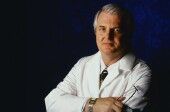Doctors Vote on the Ways to Make Biggest Difference
The BMJ has begun accepting votes on which areas of health care allow doctors to make the biggest difference to patient care, with a shortlist of six areas each being championed by eminent doctors and researchers. The winning topic will gain special coverage in the BMJ and the BMJ Group's 24 other specialist journals and online education products.

WEDNESDAY, April 9 (HealthDay News) -- The BMJ has begun accepting votes on which areas of health care allow doctors to make the biggest difference to patient care, with a shortlist of six areas each being championed by eminent doctors and researchers. The winning topic will gain special coverage in the BMJ and the BMJ Group's 24 other specialist journals and online education products.
The shortlist comprises drug-resistant infections in poor countries, palliative care beyond cancer, adverse drug reactions in elderly people, chronic pain management, multiple health problems in elderly people, and excessive drinking in young women. The list was derived from over 200 nominations by BMJ readers. Voting is open to anyone and closes on Wednesday, April 16, 2008.
A panel of 12 doctors and researchers present the case for each topic, spelling out their social impact and clinical importance. The experts include Ian Gilmore, president of the U.K.'s Royal College of Physicians in London, Zulfiqar Bhutta of the Aga Khan University in Karachi, Pakistan, and Jerry Avorn of Brigham and Women's Hospital in Boston.
"We want to be an active partner for doctors and patients and we are very much looking forward to focusing our resources across the group to improve knowledge and policy and to make a difference," said Fiona Godlee, editor of the BMJ.
Copyright © 2008 ScoutNews, LLC. All rights reserved.